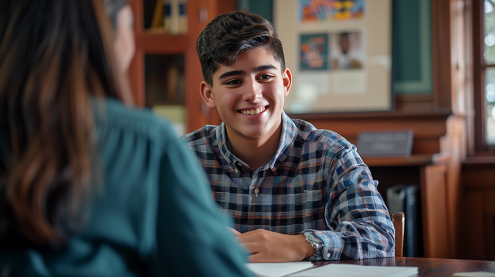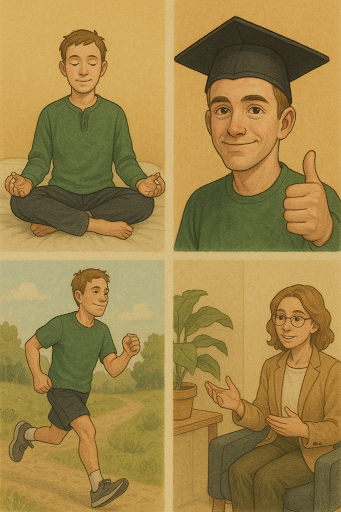What Is Senioritis? Signs, Causes, and How to Beat It

Senior year. The grand finale. The final stretch before tassels get turned and yearbooks are signed. You’d think students would be coasting toward the finish line, right? Well… not exactly. For many high school seniors, the closer graduation gets, the harder it becomes to care. That sharp focus they had during junior year? Fuzzy. The motivation they once had to study, participate, and even show up to class? Slipping. Enter senioritis—a sneaky little slump that shows up just when students need to stay sharp. The stakes are still high (college acceptances, final grades, AP exams), which makes senioritis not just inconvenient but seriously risky. Here’s how to spot it, dodge it, and get through the final semester without totally checking out.
What Is Senioritis?
Senioritis isn’t a technical diagnosis, but it’s a very real phenomenon; thus, symptoms of senioritis may vary. It’s that drop in motivation, responsibility, and general effort that hits some students in their final year of high school. Picture this: a once-stellar student starts skipping assignments, procrastinating more than usual, or submitting work that looks suspiciously like it was written during lunch. Sound familiar?

It can hit anyone—straight-A students, athletes, and even club presidents. It’s usually triggered by a mix of college admissions fatigue, burnout, and a “what’s the point?” attitude once students feel their future is locked in. But here’s the kicker: senioritis can tank grades, cause offers to be rescinded, and sour what should be an exciting end to a long journey.
How to Avoid Senioritis: Proven Tips for Senior Year Motivation
1. Set Achievable Micro-Goals for Senior Year
Forget the whole “finish the semester strong” thing—it’s too vague. Instead, break down the next few months into weekly goals. One week might be “submit all assignments on time,” the next could be “study three days for that econ test.” Bite-sized wins feel way more doable and keep you feeling like you’re making progress.
2. Connect Your Studies to Your Future Goals
Let’s be honest: part of senioritis is thinking about the next big thing—college, gap year, world domination. Use that. If you’re heading to a school with a killer science program, lean into your final bio projects. If your future roommate’s into film, start watching their favorite directors and writing reviews for fun. Connect your current classes to your future self.
3. Maintain Engagement with Enjoyable Activities
When motivation dips, it’s easy to step back from everything—especially extracurriculars. But if you loved the debate club or the school paper, stay in it. These are the things that spark energy when school feels like a slog. Bonus: they also make for great end-of-year memories.
4. Use Healthy Competition as Motivation
Challenge a friend to see who can keep the best attendance streak. Set a bet on who gets the better essay grade. Keep it friendly, but give yourself a little reason to care again. Even if it’s just for bragging rights.
5. Seek Support When Feeling Overwhelmed
Senior year can feel like a juggling act, especially with APs, college decisions, and looming goodbyes. If you’re drowning in apathy or feeling overwhelmed, talk to someone—a teacher, counselor, or even your favorite lunch lady. Sometimes just saying “I’m burned out” out loud helps you start to dig out of it.
How to Cope with Senioritis: Getting Back on Track

There’s no magic pill, but there are ways to manage the symptoms.
Refresh Your Routine to Reignite Motivation
Maybe your current schedule isn’t workinganymore. Try starting homework at a café instead of your room. Add a morning walk before school. Shake things up to make your day feel less like rinse and repeat.
Use Small Rewards to Stay Engaged in Senior Year
If you finish your essay, you get an episode of your favorite show. If you study for two hours, you get bubble tea. The trick is to find small, satisfying rewards that keep you going. Just don’t let the reward become the main event.
Boost Focus by Changing Your Study Environment
Sometimes a new environment can snap you out of a slump. Study at the library. Sit in a different seat in class. Rearrange your desk. New surroundings can give you just enough mental jolt to re-engage.
Reconnect with Your Goals to Power Through Senioritis
Take a moment to reflect. Look back at your freshman year self—the kid who dreamed of this moment. Write a letter to your future self. Make a vision board for college. Remind yourself that finishing strong isn’t just about grades—it’s about honoring all the work it took to get here.
Look Forward: Plan a Fun Senior Year Event
Give yourself something to look forward to—a class party, a senior prank (that doesn’t involve getting suspended), or a final group trip. When there’s joy ahead, it’s easier to push through the slog.
Key Takeaway
Senioritis is sneaky, but it doesn’t have to sabotage your finish. With a little awareness, some smart strategies, and maybe a smoothie bribe or two, seniors can stay motivated enough to cross the stage with pride and passing grades. The finish line’s close. Don’t trip now.
Need Help? Cardinal Education Can Lend a Hand!
It can’t be denied that the added stress from admissions increases the likelihood of senioritis. That’s why we always strive to help students and their families the best way we can. Here at Cardinal Education, we offer help by giving you the necessary skills to succeed in your academic journey. With academic coaching and test prep, we ensure students are in their best shape to tackle any tasks!
Like what you see here? We are happy to permit you to use our material as long as you link back! Please refer to us as the Cardinal Education Blog.
Frequently Asked Questions
- What are the signs that I (or my kid) has senioritis?
If your once-dedicated student suddenly treats school like it’s optional, senioritis might have made itself at home. Signs include missing assignments, suddenly “forgetting” about tests, constantly checking the clock in class, or answering every school-related question with “It doesn’t matter anymore.” You might also notice a magical ability to binge-watch shows while completely ignoring their homework pile. It’s like watching a motivational balloon slowly deflate. The key is spotting the shift early and gently nudging them back on track. Senior year is the final lap, and even if the finish line is in sight, you still need to keep your sneakers tied and your pace steady.
- Can senioritis actually affect college admissions?
It absolutely can. Just because a student got the “Congratulations!” letter doesn’t mean the job’s done. Colleges expect students to finish strong, and if final grades nosedive, admissions offices can and will take a second look. Yes, they really do send warning letters. In some cases, they’ll even revoke an offer, which is the academic version of having the rug pulled out right before prom. And even if the offer sticks, lower grades might mess with placement, prerequisites, or class standing. Think of senior year as the cool-down round of a workout. You don’t want to pull a muscle right before the victory lap.
- How is senioritis different from burnout?
Burnout and senioritis may look similar, but they’re not quite the same beast. Burnout is full-on exhaustion from doing too much for too long. You want to care, but you’re too fried to function. Senioritis? That’s more of a “meh, do I really need to?” mindset. It’s not that the student can’t do the work—they just don’t want to. Burnout needs rest, deep breaths, and probably a nap. Senioritis needs a goal refresh, a reality check, and maybe some creative bribery. Both are real and manageable, but figuring out which one you’re dealing with is step one in getting back on track.
- Is senioritis a real condition?
Senioritis might not be listed in any official medical journal, but it’s about as real as the awkward middle school phase we all endured. It’s not just an excuse to wear sweatpants to school and turn every assignment in late. It’s a very common reaction to a big life transition. After years of deadlines, tests, and college stress, some students just hit a motivational wall. Their brain starts saying, “We’re done here,” while school says, “Not quite.” It’s part mental fatigue, part impatience, and part longing for what’s next. So no, it’s not fake. But yes, it needs to be addressed before it tanks a transcript.



